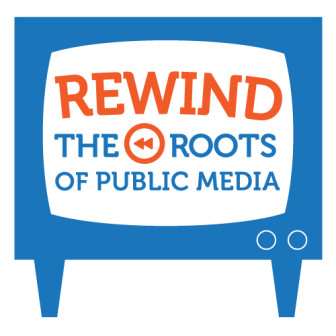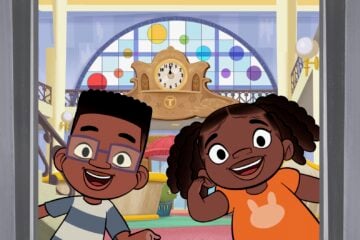The enduring and accessible legacy of ‘Vegetable Soup,’ a 1970s TV show that embraced cultural diversity
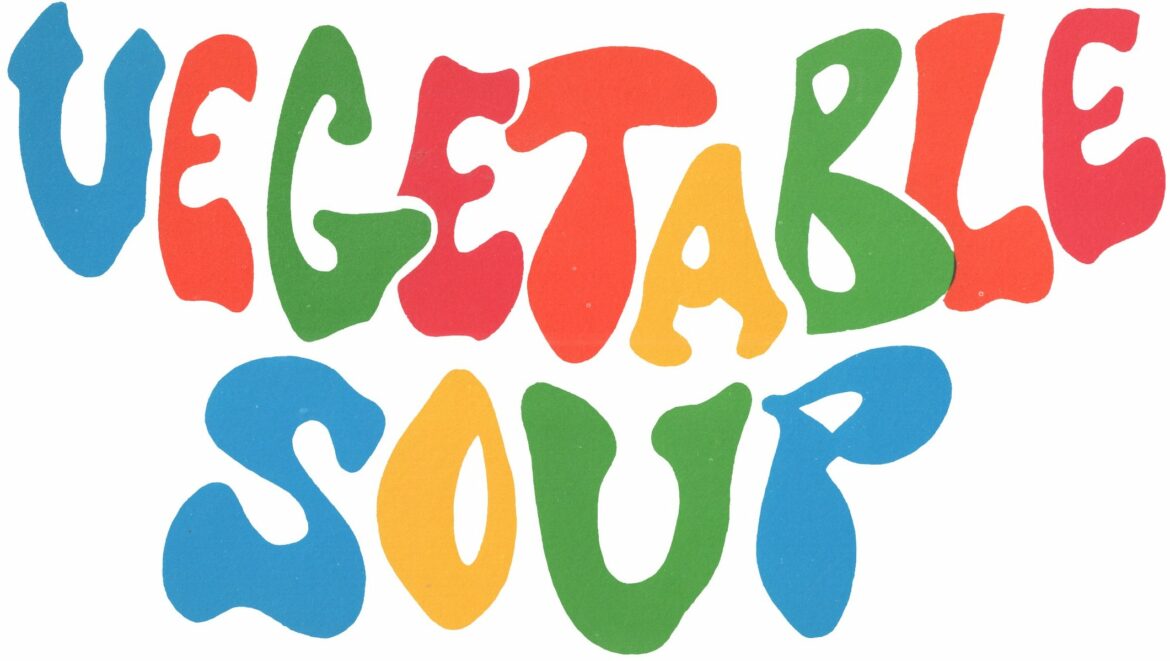
An earlier version of this post was previously published on the website of the National Library of Medicine.
In February 2020, the American Archive of Public Broadcasting, a collaboration between the Library of Congress and Boston’s GBH, announced the preservation and inclusion of the landmark 1970s children’s television series Vegetable Soup in its freely available online collection. The historical significance of this series, combined with the technical expertise dedicated to preserving it and making it freely available, yields a story worth sharing to appreciate this chapter in the history of public media and to inspire more efforts to preserve such productions and make them publicly accessible.
Vegetable Soup was unique, being the first publicly funded series to be broadcast on both public and commercial stations nationwide, and on cable television via Warner–Amex Satellite Entertainment. Moreover, it was unlike any other contemporary or previous children’s television program, as it was based primarily and fundamentally on the understanding that racism and racial differences were social determinants of health in the lives of all children. It was a product of its time, a period of racial tension in America and substantial public health research focused on the influence of television in the lives of young people.
Emblematic of the unique purpose and intention of Vegetable Soup was the opening sequence of the series. It welcomed young viewers with a score by award-winning composer Peter Link, then best known for his work on the rock opera Salvation, combined with animation by acclaimed artist James A. Simon, president and creative director of Wantu Animation, the first fully African American animation studio. The lyrics to the score invited everyone to “come on along and join us” as singing faces and multicolored, music-playing individuals encouraged viewers to embrace the allegory that “it takes all kinds of vegetables [individuals] to make vegetable soup [our world].”
Yanna Kroyt Brandt, EP and showrunner of Vegetable Soup, made clear her intentions in a contemporary interview:
The melting pot idea is no longer viable. Many people don’t want life to be a melting pot. They want to be a part of the whole, yet they want to maintain their own ethnic and cultural identities. The aim of the program is to help children learn to live together in appreciation of the common humanity of different peoples. We are not naive enough to think that television can suddenly change anyone’s deep-seated prejudicial attitudes; but it can certainly present positive images and evidence which contradict negative attitudes. This is especially true for young children 8 to 12, during those crucial years of development.
With this target audience and overall focus, Brandt and her creative team made Vegetable Soup different from one of the most popular and publicly funded contemporary children’s programs: Sesame Street. “I don’t consider [Vegetable Soup] competitive with Sesame Street in any way,” Brandt explained. “Sesame Street is for children younger than six. … It teaches them mathematics and how to read. We’re talking about attitudes.”
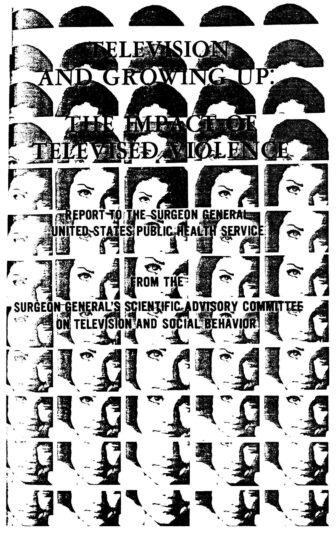
Link and Simon joined a large, diverse group of writers and producers who came together under Brandt’s direction to craft and curate the multiethnic focus of Vegetable Soup. In identifying, gathering and orchestrating this collective talent from multiple minority backgrounds, Brandt abundantly met — and exceeded — the clear expectation of the federal government that the series would “employ members of minority groups in responsible positions in [its] development, production, and administration.” In her achievement, Brandt embraced an approach to producing the series as forward-thinking as the series itself, fundamentally because she believed that one could not achieve the latter without the former. As Brandt recalled in a 2013 interview, “I was determined that we were going to search out and hire minority crews, minority producers, minority editors, all sorts of people of color, not just African American but Hispanic and Asian, etc. And to have a real United Nations. And to help these people train so they could then get jobs in the mainstream industry. … So, Vegetable Soup was not only about doing the program. It was also about how the program was going to be done.”
Complementing the talent of these contributors and augmenting the public profile of the series was the participation of several prominent personalities of the day, including singer Bette Midler and actor James Earl Jones. Midler served as the voice of Woody the Spoon in what would become a popular sequence of the same name, animated by Simon, in which Woody helps the viewing youngsters cook up tasty, easy-to-follow ethnic recipes. James Earl Jones lent his voice to the animated character of Long John Spoilsport, who taught children how not to behave in the sequence “The Big Game Hunt.” Other animated characters included Luther and his friends, created by Brumsic Brandon Jr. from his nationally syndicated comic of the same title — one of the first such comics to feature a mainly black cast of characters. Other high-profile personalities who contributed their time and talents to Vegetable Soup included Mexican American actor Ricardo Montalban, Paul Russell of the Dance Theatre of Harlem, Black ventriloquist Willie Tyler, folk singer Bill Withers, Native American ballet star Maria Tallchief, Asian American dancer and singer Pat Suzuki and Puerto Rican jockey Angel Cordero.
The overarching achievement of Brandt and her contemporaries can now be fully appreciated thanks to the online availability of Vegetable Soup, made possible through the support of the New York State Archives and the expertise, collaboration and dedication of the archivists there and at the AAPB, the Library of Congress and GBH. Indeed, this collaboration brings Vegetable Soup into the digital age and fulfills its promise as a publicly funded initiative.
Vegetable Soup became the focus of Jeff Reznick’s research in 2016 when he was studying the history of the U.S. Department of Health, Education, and Welfare (HEW), the predecessor agency to the Department of Health and Human Services. HHS is the current home of the National Institutes of Health and the National Library of Medicine. Jeff recalled HEW having funded many television programs during the 1970s, including Vegetable Soup, which it did through a grant to the New York State Education Department. This recollection led him, in 2017, to the NYSA, where Monica Gray and her colleagues oriented him to the depth and breadth of their collections, including substantial written, printed and visual materials pertaining to the development and reception of the series.
Thanks to this understanding and access to these public records through the expertise of Monica and her colleagues, Jeff was able to complete his writing and, in 2018, publish “A Noble Experiment in Human Values”: The Children’s Television Series Vegetable Soup and its Initiative to Change the Environment for Racism in 1970s America” in the Journal of Popular Film and Television, as well as the associated video abstract produced by his NLM colleague Donny Bliss. For their collaborative work, Jeff and Donny were privileged to receive the 2020 NLM Board of Regents Award for Scholarship or Technical Achievement for “documenting the history of social determinants of health through the lens of the 1970s public television program Vegetable Soup.” New York Archives Magazine kindly published a shorter version of Jeff’s research article.
However, all of this was just the beginning of the journey to bring one of the most interesting television shows of the 20th century fully and freely into the 21st.
Discovery and digitization at the New York State Archives
In 2017, with the awareness that Vegetable Soup was a focus of research interest, State Archives staff, including Monica and Laura Montgomery, revisited the collection of both series of the original recordings of Vegetable Soup on 39 U-matic tapes, a common video-recording format in the 1970s but today obsolete and therefore requiring archival expertise for preservation. The State Archives staff examined the paper and audiovisual records related to the production to create a finding aid that describes and provides context for the collection of records and can be used by researchers to find relevant records.
The records were digitized based on Jeff’s initial access request, but the State Archives took the opportunity to use this project to develop criteria for selecting and digitizing other audiovisual material in its holdings. Laura created a prioritization rubric to identify format, preservation issues, any legal restrictions arising from content, and descriptive information for each collection of audiovisual records. Based on this rubric, Laura then carried out a collection survey to identify the preservation and description needs of 40,000 audiovisual records across 200-plus audiovisual collections and to prepare a framework for a large-scale digitization project.
The entire digitization process for the Vegetable Soup U-matic tapes took about a year spanning 2017 to 2018. Laura selected a vendor and packed up the records for digitization, along with a detailed inventory. The vendor digitized the records according to agreed standards, then Laura performed quality control, prepared item-level metadata descriptions and finally processed the files through archival access and preservation workflows. Due to preservation issues related to age and format, 20% of the tapes needed preservation remediation before being digitized. The State Archives received .mov format preservation master files and MP4 web-accessible versions.
The access copies were uploaded to Digital Collections of the New York State Archives and the associated YouTube channel to take advantage of the automated closed-captioning functionality for accessibility. Through this whole process, the State Archives staff was able to learn about the scalable needs of digital storage for future digitization projects.
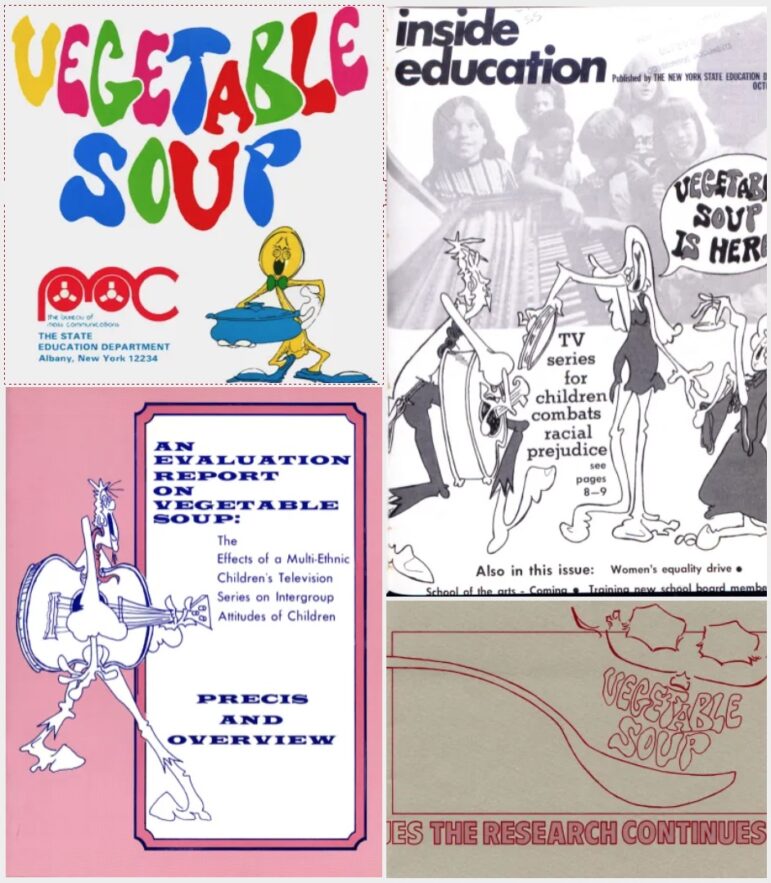
Preservation, access and curation: collaboration among the American Archive of Public Broadcasting, the Library of Congress and GBH
The availability of Vegetable Soup in the American Archive of Public Broadcasting represents a prime example of the mission of the Archive, which CPB instituted in 2013 to coordinate a national effort to preserve and make accessible significant historical content created by public media. The Archive is a collaboration between the Library of Congress and GBH in Boston. In the framework of the collaboration, the Library of Congress focuses on the long-term preservation of files in its data center located at the National Audio-Visual Conservation Center in Culpeper, Va., while GBH focuses on facilitating access through the Archive website.
Staffers at the NAVCC routinely validate files and migrate them to newer storage media to ensure they are stored in the most up-to-date manner. The files are then linked to a metadata record in the collection management database of the center, and researchers can view all files available in the Archive onsite in the Library’s reading rooms.
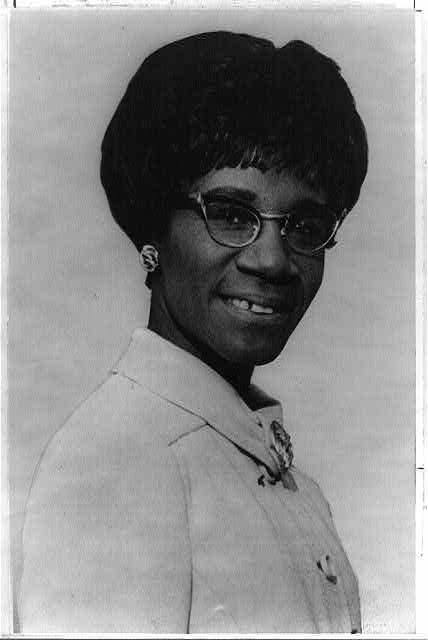
GBH’s responsibilities as part of the Archive focus around making proxy-level files available on the Archive website. Proxy files are smaller and lower-quality than the preservation files stored at the Library of Congress, but their smaller size enables them to be hosted online much more easily. To make files accessible, archivists at GBH create online records, preserve copies in offline storage for long-term retention, and perform rights review to make sure that records don’t contain copyright violations or anything embarrassing, defamatory or private.
Understanding the archival principle of LOCKSS (“lots of copies keeps stuff safe”) and that multiple access points to archival collections help to break down silos, the Archive team collaborated with Jeff and Monica to acquire digital copies of the programs. Preservation copies of the programs were obtained for long-term preservation at the Library of Congress, while GBH obtained metadata and proxy copies provided by the New York State Archives for online access via the archive website.The American Archive of Public Broadcasting continues to grow and in 2023 was awarded a $16 million grant from the Mellon Foundation to double the size of the Archive collection over the next four years, among other goals. The Archive’s staff has funding to digitize up to 150,000 public media programs from across the country and is seeking stations and organizations interested in taking part in this project. If you are interested in learning more about this project, please contact Casey Davis, associate director of the GBH Archives/American Archives of Public Broadcasting Project Manager, at casey_davis@wgbh.org.
In its own day, Vegetable Soup was a remarkable collaborative achievement, hailed by the New York clinical psychologist Salvatore Didato as “a noble experiment in human values.” Today, the digital availability and preservation of Vegetable Soup is itself a remarkable collaboration among professionals of multiple disciplines and organizations, and an important contribution to the historical record as a resource for ameliorating the negative effects of racism and racial isolation on all children.
Rachel Curtis is a digital project specialist at the Library of Congress and a project coordinator for the American Archive of Public Broadcasting.
Monica Gray is senior archivist in the Researcher Services unit of the New York State Archives.
Laura Montgomery is an archivist in the Digital Strategies unit at the New York State Archives.
Jeffrey S. Reznick, Ph.D., is chief of the History of Medicine Division at the National Library of Medicine.
Miranda Villesvik is a senior archivist at GBH, Boston.
This essay appears as part of Rewind: The Roots of Public Media, Current’s series of commentaries about the history of public media. The series is created in partnership with the Radio Preservation Task Force, an initiative of the Library of Congress. Josh Shepperd, assistant professor of media studies at the University of Colorado Boulder, director of the LOC’s Sound Submissions Project and chair of the RPTF, is Faculty Curator of the Rewind series. Email: josh7759@colorado.edu


